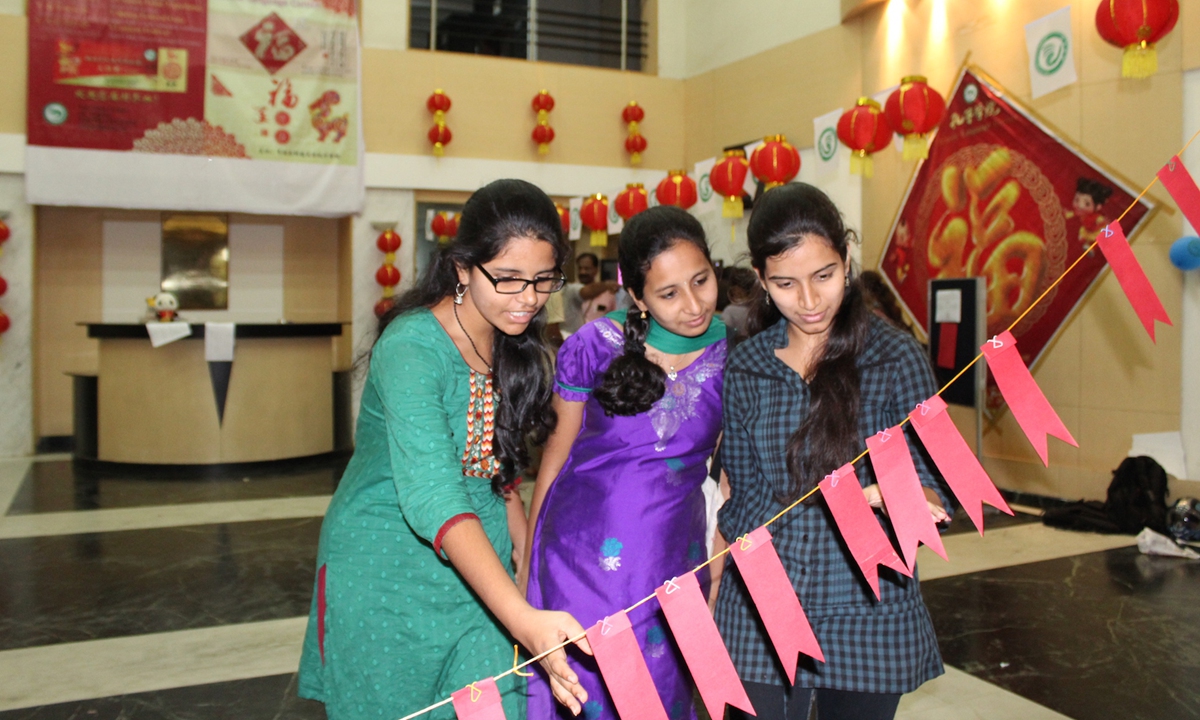Friendly NGOs strive to boost people-to-people exchanges to ease tensions
By Huang Lanlan Source: Global Times Published: 2020/8/6 19:51:42

Indian students attend Chinese cultural events at the Confucius Institute in the VIT University of India. Photo: Confucius Institute in the VIT University
Border clashes in June and the subsequent Indian government ban on several Chinese mobile apps have cast a shroud of uncertainty over China-India relations, but some nongovernmental organizations in the two countries reached by the Global Times said they are working hard to ease and improve relations between Chinese and Indians.
When the nationalist and anti-China sentiments grew in Indian society in late June after the China-India border friction in the Galwan Valley, as Indian domestic media reported, an Indian-built art group was doing a livestreaming event where Indian artists performed online for their Indian and Chinese audiences.
The event was received warmly among Chinese audiences with several millions of views, said the group's co-founder Ravi Shankar Bose. "We are making effort in bringing the cultural exchange back on track," he told the Global Times.
Having been living in China for years, Bose established the nonprofit group named Chaiti Arts Foundation (Chaiti) in Shanghai in 2013 with his friend Siddharth Sinha. Through the years, Chaiti has been showcasing classical Indian music and dance performances for Chinese audiences.
The unprecedented COVID-19 pandemic and the border clash this year didn't stop the group's role in promoting cultural dialogues between Indian and Chinese people, as the group is shifting online to continue its performances and interactions, Bose said.
Art and culture are positive elements that can contribute to smoothing the relationship between peoples of the two countries, the group said. "They have no boundaries, and they are for everybody to experience," Sinha told the Global Times. "That will bring a great deal of unity."
Back in India, the nationwide India China Friendship Association (ICFA) said it is "doing best to promote peace among Indian citizens" who show an antipathy against China. Since the border clash, the association has been tackling anti-China sentiments "with love and explanation" on Indian social media platforms, said ICFA President George Fernandes.
China and India respectively rank 2nd and 6th in the world in terms of economy. The two big developing countries can't afford to have friction at any level, he noted.
Fernandes said the top leaders of China and India are great statesmen and he is confident that they will solve all problems amicably very soon with wisdom.
This year marks the 70th anniversary of the establishment of diplomatic relations between China and India. In China, the Chinese People's Association for Friendship with Foreign Countries (CPAFFC) is preparing a series of celebrations to further improve relations between Chinese and Indian people in this particular year.
The association is planning a short video to commemorate the 110th birth anniversary of Indian doctor Dwarkanath Kotnis in October, who was dispatched to China for medical assistance during the War of Resistance against Japanese Aggression (1931-45), a CPAFFC member, told the Global Times.
Days after the border clash, on June 21, Chinese yoga lovers and students of India-China Yoga College under Yunnan Minzu University (YMU) gathered in Kunming, Southwest China's Yunnan Province to celebrate the annual International Day of Yoga. They discussed and practiced Yoga with Indian yoga experts and enthusiasts online.
The current situations don't obstruct exchanges between Chinese and Indian ordinary people, said Duan Gang, vice-principal of YMU. "We will continue promoting dialogue and understanding among cultures and civilizations of the two countries," he said in a speech on June 21.